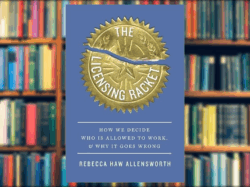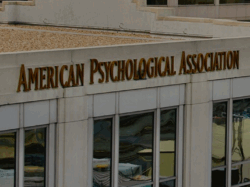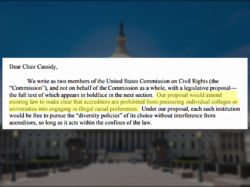
Imagine a board run by your competitors who decide whether you’re allowed to work. That is the process of licensing. Rebecca Haw Allensworth’s The Licensure Racket opens with the story of Omar Mahmoud, a 52-year-old Army veteran, Arabic-speaking immigrant, and licensed barber. After moving to Tennessee, he hoped to continue the career he had pursued […]
Read More
The Trump administration just issued an Executive Order to prohibit accrediting organizations from imposing “diversity, equity, and inclusion” (DEI) policies on universities. The Secretary of Education shall, as appropriate and consistent with applicable law, hold accountable, including through denial, monitoring, suspension, or termination of accreditation recognition, accreditors who fail to meet the applicable recognition criteria […]
Read More
The Commission on Accreditation (CoA) of the American Psychological Association (APA) released a memo a few weeks ago to inform clinical psychology programs of their decision “to immediately and temporarily suspend evaluation of programs for compliance with several specific accreditation standards. The suspended standards are those related to faculty and student program actions in the […]
Read More
Editor’s Note: The following excerpt is from an article originally published by Diogenes In Exile on May 5, 2025. With edits to match MTC’s style guidelines, it is cross-posted here with permission. It is high noon, and the dust is swirling between higher education accreditors and the executive branch of the U.S. government. The president has […]
Read More
Progressive bureaucrats, student activism, eager donors, peer pressure: higher education institutions have an array of internal and external drives for promoting race, gender, and other leftist ideologies, but a powerful factor lies with mandates from accreditors to comply with diversity standards for institutional culture, staff and faculty hiring, student outcomes, and other relevant areas. In […]
Read More
Higher education accreditation is an arcane but vitally important target for reform in the new administration. Accreditation is used to ensure colleges meet a minimal level of quality—colleges without an accreditor approval do not have access to federal financial aid programs like Pell Grants and student loans. But accreditation is broken. As I lay out […]
Read More
Editor’s Note: The following is an excerpt of an article originally published on the author’s Substack Diogenes In Exile on January 10, 2025. With edits to fit MTC’s style, it is crossposted here with permission. What if accreditors were directly accountable to the people their standards affected the most, students? It would be so much […]
Read More
Editor’s Note: The following is an excerpt of an article originally published on the author’s Substack Diogenes In Exile on December 2, 2024. With edits to fit MTC’s style, it is crossposted here with permission. Under what circumstance would it be acceptable for accreditors to knowingly require a standard that flouts state law? The idea is worth consideration […]
Read More
Editor’s Note: The following is an excerpt from an article originally published by The James G. Martin Center for Academic Renewal on January 31, 2025. With edits to match Minding the Campus’s style guidelines, it is crossposted here with permission. Higher education seemingly played an important, if largely negative, role in the recent presidential election. Exit polls showed […]
Read More
Editor’s Note: The following is an article originally published on the author’s Substack Diogenes In Exile on November 11, 2024. With edits to fit MTC’s style, it is crossposted here with permission. Tremors from the election continue to ripple across the country, and the meltdown among the Democrats rages on. What is undeniable is that there […]
Read More
On October 2, a trial court dismissed Florida’s lawsuit against the Biden Education Department, claiming that accreditation methods for institutions of higher education are illegal. But the state will almost certainly re-file its complaint or appeal to continue its fight against an accreditation system gone bad. Florida says the current system is unconstitutional because it violates the […]
Read More
Accreditors serve as key gatekeepers in higher education. Without accreditation, a college’s students are not eligible to receive federal financial aid such as Pell grants and federal student loans. This gives accreditors a fairly unique role in allocating federal spending—these private entities decide whether taxpayer dollars will flow to a college. Given that the public […]
Read More
American higher education is failing. There are numerous reasons for this, such as the pervasive deconstructionism in the academy exampled by young rioters destroying monuments to the very heroes who in the past supported similar causes to those of our modern-day “revolutionaries.” Rarely discussed, however, are the negative externalitiesof careless accreditation. Accreditors are supposed to assess the […]
Read More
The college accreditation system is supposed to uphold academic quality and integrity. Many Americans assume that if a college or university is accredited, that is equivalent to the Underwriter’s Laboratories (UL) seal on appliances – that it has been tested and found to be of good quality. Accreditation is a reliable stamp of approval, isn’t […]
Read More
Stealing from Shakespeare: “Let’s kill all the accreditors.” In this kinder and gentler age, most of us would be content if college accreditors simply resigned their positions and did something useful, such as selling cars. When you buy a car, you pay about the same as a year’s tuition fee at a good university. Yet […]
Read More
America’s higher education system works like this. The government dangles lots of easy-to-get money for college in front of every high-school graduate, nearly all of whom have heard repeatedly that a college degree is essential for a decent life. Without “higher education,” their lives will be nothing but low-paid drudgery. Salvation lies in enrolling in […]
Read More
By Richard Vedder Although difficult to measure, it is unlikely that higher education has had any productivity advance in the 50 years since I finished college. Economists like Princeton’s William Baumol have argued that rising college costs are inevitable, given inherent limitations on reducing the cost of disseminating knowledge -only so many people can fit […]
Read More
The History Channel’s popular series “The Men Who Built America” portrays an incredibly wealthy – yet worried – John D. Rockefeller. Rockefeller, who earned much of his vast fortune by producing and refining kerosene, was facing competition not from rival magnates – the Carnegies or Vanderbilts – but from the likes of Thomas Edison and […]
Read More
Andrew, I understand that you were critiquing the accreditation system in general. I agree that it’s not perfect and could focus more directly on what students actually learn rather than on inputs and processes. I do think, though, that when a university doesn’t even have an adequate system in place for monitoring and assessing student […]
Read More
Charlotte Allen‘s response to my recent piece on the denial of accreditation for Ashford contains some good material, but some misunderstanding. My piece is not about whether the Ashford decision itself was flawed–I never stated that WASC was wrong to deny Ashford accreditation and flatly stated: “It is certainly possible that Ashford doesn’t deserve accreditation…” […]
Read More
I agree with Andrew Gillen that a large segment of entrenched academia reflexively opposes for-profit colleges and online education. These people don’t even like the MOOCs (Massive Online Open Courses) started by MIT and Harvard! That said, I don’t see any evidence that the WASC acted unfairly when it refused accreditation to Ashford University’s massive, […]
Read More
The world of higher education is abuzz with the news that a for-profit university, Ashford University, whose Iowa campus holds accreditation from the North Central Association of Colleges and Schools, has been denied accreditation by the Western Association of Schools and Colleges (WASC) for its online headquarters. Denial of accreditation for schools that already have […]
Read More
Crossposted from OpenMarket.org The New York Times featured an excellent news story Sunday by David Segal on the costly white elephant that is legal education in America. He describes how law school is expensive because of government-enforced accreditation standards that prevent law schools from containing costs even if they wanted to (and in truth, most […]
Read More
A few years ago, under intense pressure from Congress, NCATE (the national organization that accredits Education programs) abandoned its requirement that, in order to obtain accreditation, Education schools needed to measure the “disposition” of each and every prospective public school teacher to promote social justice. (The mandate didn’t apply to schools that don’t list promotion […]
Read More
During my service as a member of the accreditation committee of the American Bar Association, the ABA added a 200th school to their roster of accredited law schools. This growth could be seen as a cause for celebration– the roster of new schools included many with missions that would clearly benefit society. Public service law […]
Read More
On paper, accreditation is an amazing system. Among other things, it simultaneously advises colleges on how to improve, enforces a minimum level of quality, provides needed information to policy makers, and protects colleges from government intrusion. It does all this with only a few hundred employees, and a few thousand volunteers. Indeed if accreditation actually […]
Read More
A story in the March/April issue of the Washington Monthly about the demise last year, after its accreditation was pulled, of the financially and academically troubled Southeastern University in Washington, D.C., hit close to home. My home, actually, because I live just four blocks away from Southeastern’s decrepit single-building campus in Washington’s sleepy Southwest quadrant […]
Read More
The National Council for the Accreditation of Teacher Education (NCATE) seems finally to have perceived what was in plain view to many people: that most of America’s ed schools are mediocre at best, offering curricula that mix lightweight courses, ivory-tower ideology, and minimal clinical exposure of student teachers to real-life classrooms. NCATE has revised upwards […]
Read More
The Western Association of Schools and Colleges (WASC) is at it again. In the latest set of rulings to come from this regional accreditor’s Commission for Community and Junior Colleges, fifteen institutions find themselves in various states of probation or warning or show cause. No school is shut down; the federal dollars keep flowing. And […]
Read More
Many in the One Dupont Circle crowd talk a good game about the “Federal Ministry of Education” and the threat of nationalized standards. (See “The Future of Accreditation” in Inside Higher Ed by Judith Eaton, president of the Council for Higher Education Accreditation – a meditation on what accreditation will look like in 2014.) But […]
Read More